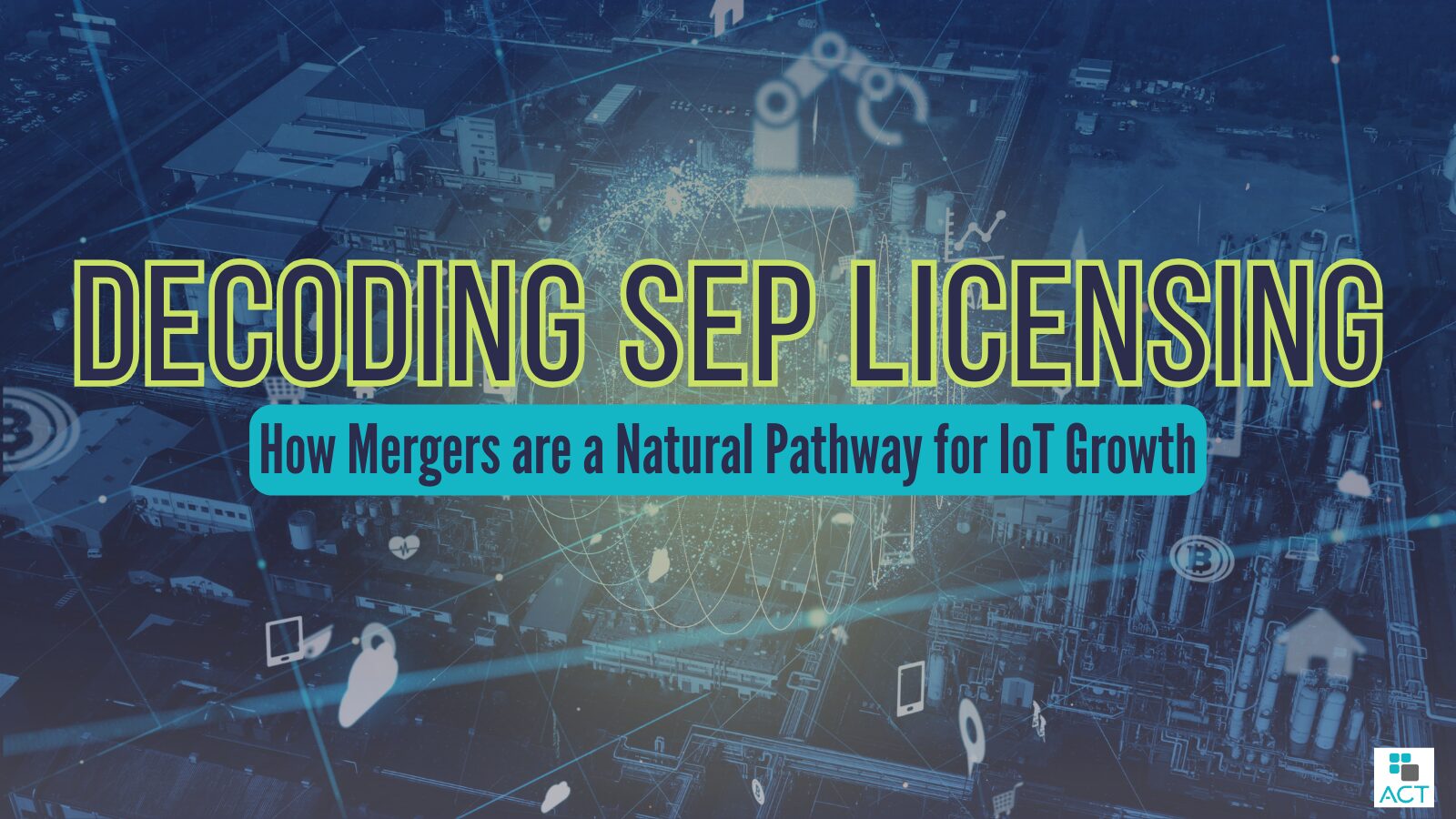The digital marketplace is a crucial global economic driver, with digitalization poised to add $100 trillion in additional value to the world economy by 2025. Central to this transformation is the adoption of artificial intelligence (AI) and Internet of Things (IoT) technologies. The widespread adoption of AI and IoT drives innovation and creates business opportunities for entities looking to invest in micro, small, and medium-sized enterprises (MSMEs).
In this hyper-connected era, investing in and integrating connected devices and systems is vital for maximizing economic potential. This blog in our “Decoding SEP Licensing” series explores the relationship between standard-essential patent (SEP) licensing policy, the appetite for investment, the mergers and acquisitions (M&A) landscape, and the impact on small business innovation. It highlights policymakers’ need to ensure fair and transparent SEP licensing to support MSMEs innovating in the AI and IoT spaces.
Are you curious about the other blogs in this series? You can find “Part One: Decoding SEP Licensing: A Comprehensive Guide for the IoT and AI Revolutions” here and “Part Two: Decoding SEP Licensing: IoT and the Future of Sustainable Technology” here.
SEP Licensing and MSMEs
Fair SEP licensing practices are essential to ensuring that MSMEs can maximize their benefit to the digital economy. As defined in our glossary, a SEP is a patent voluntarily contributed to a technical standard and is critical to its use, making the SEP holder a gatekeeper to the standard. Developers need to license from the relevant SEP holder in order to use these standards as a baseline for their innovations. Standard-setting organizations (SSOs) should mitigate potential abuses by SEP holders by requiring them to commit to providing licenses on fair, reasonable, and non-discriminatory (FRAND) terms.
Ideally, SEP holders would honor their commitment to FRAND terms. However, as we have previously explained, some well-resourced SEP holders exploit ambiguous FRAND definitions outlined in SSO patent or intellectual property right (IPR) policies to abuse their dominant position, creating barriers for MSMEs seeking a license to use a standard for their innovative technologies. The lack of clear guidance further enables anticompetitive SEP licensing practices and highlights how the current system places far too much power in the hands of a small group of SEP holders, limiting the ability of MSMEs to develop exciting new AI and IoT solutions with standardized technology.
Impact of SEP Licensing Uncertainty on M&A Activity
The uncertainty surrounding SEP licensing significantly hampers small business innovation by creating additional unnecessary barriers to market entry, increasing litigation risk, and stifling creativity. Discriminatory SEP licensing practices most acutely harm MSMEs that do not have the resources of larger organizations. This uncertainty discourages investment and potential M&A opportunities, as investors avoid the risks posed by SEP uncertainty. The threat of hold-up, where SEP holders demand unreasonable anti-FRAND terms, further deters MSMEs from developing standardized technologies by scaring off potential investors. This competitive disadvantage limits MSMEs’ ability to attract investment, highlighting the need for clearer guidelines and consistent application of FRAND principles to foster a more equitable and supportive environment for innovation.
A Barrier to Exit is a Barrier to Entry
M&A is crucial to technology innovation and entrepreneurship, allowing entrepreneurs to generate returns for investors who took risks in funding early-stage businesses. Access to early-stage investors is one of the few ways for tech entrepreneurs to secure growth capital. Successful exits enable entrepreneurs and investors to see gains and reinvest in new startups, continuing the serial entrepreneur cycle, which is critical for technology innovation and small business growth. Without M&A activity, this cycle would be impossible. Reduced investment and M&A activity directly impact MSMEs’ ability to innovate.
Path Forward
Markets thrive on stability and clear policy decisions. Inconsistent regulatory landscapes delay deal timelines and product launches for MSMEs. This is especially true for SEP licensing, where a lack of clarity around SEP licensing negotiations creates a precarious environment for investment and M&A. The U.S. government should issue a national SEP policy statement that defines its commitment to a balanced, fair SEP licensing framework and leadership in standardized innovation. This policy would provide the stability needed to encourage investment, supporting the continuous cycle of innovation and growth essential for the technology sector.
Policymakers in Europe and the UK are pursuing regulatory reforms to improve the SEP licensing framework. In addition to the need for the U.S. Congress and relevant regulatory agencies to clarify FRAND licensing practices, it is just as crucial that they act to address ongoing M&A issues to protect small businesses.
